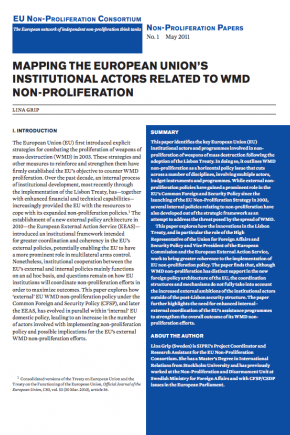Mapping the European Union's Institutional Actors related to WMD Non-proliferation
This paper identifies the key European Union (EU) institutional actors and programmes involved in nonproliferation of weapons of mass destruction following the adoption of the Lisbon Treaty. In doing so, it outlines WMD non-proliferation as a horizontal policy issue that cuts across a number of disciplines, involving multiple actors, budget instruments and programmes. While external nonproliferation policies have gained a prominent role in the EU’s Common Foreign and Security Policy since the launching of the EU Non-Proliferation Strategy in 2003, several internal policies relating to non-proliferation have also developed out of the strategic framework as an attempt to address the threat posed by the spread of WMD. This paper explores how the innovations in the Lisbon Treaty, and in particular the role of the High Representative of the Union for Foreign Affairs and Security Policy and Vice President of the European Commission and the European External Action Service, work to bring greater coherence to the implementation of EU non-proliferation policy. The paper finds that, although WMD non-proliferation has distinct support in the new foreign policy architecture of the EU, the coordination structures and mechanisms do not fully take into account the increased external ambitions of the institutional actors outside of the post-Lisbon security structure. The paper further highlights the need for enhanced internal– external coordination of the EU’s assistance programmes to strengthen the overall outcome of its WMD nonproliferation efforts.

